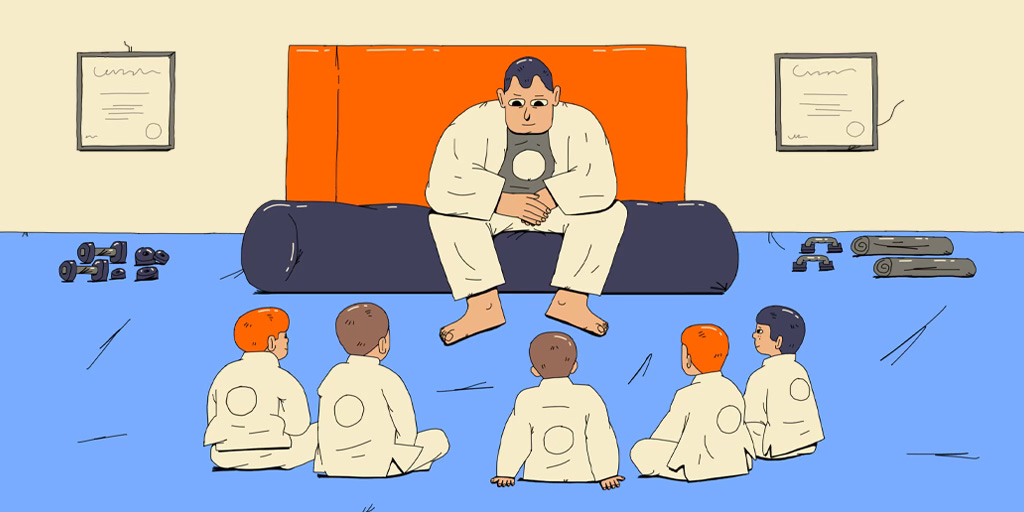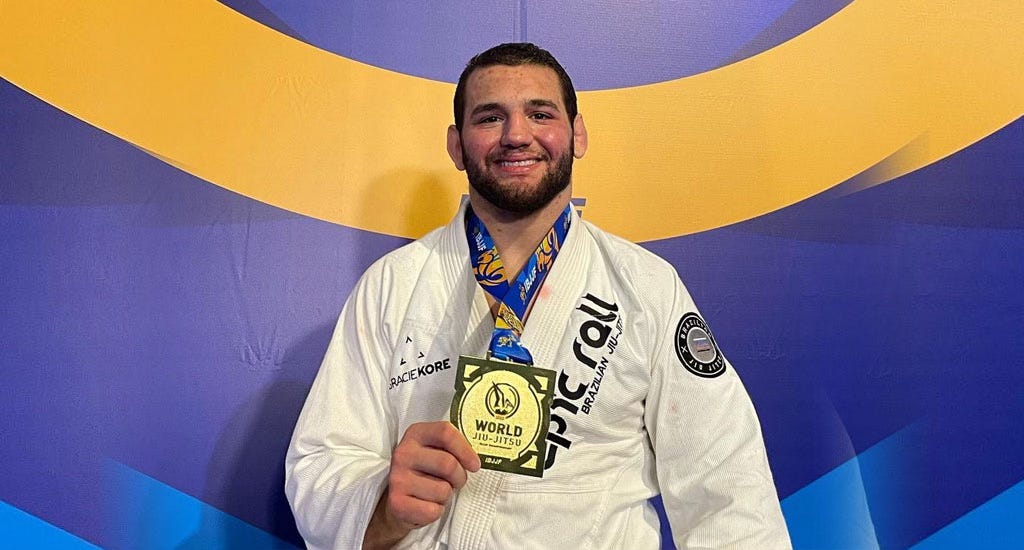"There was always this level of expectation that I had to perform a certain way. Everybody was expecting me to not only win, but to submit and dominate. I saw it as a burden in the beginning… but over time, it became a blessing." — Rayron Gracie
Some of us spend our lives searching for our passion. Others are born into one, whether they want it or not.
Rayron Gracie understands this better than most. As a fourth-generation member of the world’s most famous jiu-jitsu family, the pressure to love and excel at the sport was immense from the day he was born. But passion isn’t inherited — it’s something we each have to cultivate on our own. We may be told early on what we should love — whether it’s a career, sport, or family tradition — but until we find our own connection to it, that passion can feel like a burden.
“I hated it as a kid,” he admits with a laugh, when I ask about his early relationship with jiu-jitsu. It’s a surprising response, given his family’s towering reputation. But perhaps not so surprising — most free-thinking people resist being put into a box, especially when that box is as imposing as the Gracie name.
“I would do anything but jiu-jitsu,” Gracie recalls of his youth. “Sign me up for boxing. Sign me up for judo. Sign me up for Muay Thai. Anything except jiu-jitsu, right?”
But growing up in Brazil with a name synonymous with the sport, he couldn’t escape it. The pressure to train came from all sides — his family, those around him, and even himself. He was a Gracie, after all, and he was supposed to love jiu-jitsu. Despite his resistance, he was immersed in it from a young age.
“You’re going to train to become a champion,” his aunt told him. “You don’t have to fight. But you will train as if you are. So you’re going to develop this skill whether you want it or not.”
Gracie trained, but reluctantly. At 15, drawn more by the challenge than by love for the sport, he entered a competition — and lost badly. Afterward, his opponent and the opponent’s father asked to take a photo with him because of his famous last name. He was mortified.
“Now, I wouldn’t care,” he says. “But as a kid, I was so embarrassed and humiliated.”
After that loss, Gracie signed up for more competitions. He no longer needed prompting from his family — now, he had something to prove to himself. The pressure that once felt like a burden slowly began to fuel him.
“There was always this level of expectation that I had to perform a certain way,” he says. “Everybody was expecting me to not only win, but to submit and dominate.” At first, it weighed him down, but over time, it became a blessing. “When your back is against the wall, you’ve got to fight harder, right? So you’re a Gracie, you have to represent your family.”
It wasn’t just about living up to the Gracie name anymore — it was about finding his own path within that legacy.
At first, the losses kept coming. Eventually, he started winning — and never stopped. Today, Gracie is a 4x Brazilian jiu-jitsu world champion, having won the prestigious Worlds at every belt level and ranked #1 at each stage. Last year, he was promoted to black belt by his cousin Kyra Gracie, becoming the first member of the Gracie family to receive a black belt from a woman — a milestone he’s clearly proud of.
It didn’t happen overnight, but as he shifted from focusing on others’ expectations to his own, Gracie began developing his own appreciation for the sport outside of his family’s influence. Once he found that passion, he never looked back.
So what drives that passion today?
For Gracie, it’s the physical touch and sense of community that stand out. “It’s so hard to get social interactions with people these days, especially on a physical level,” he says. “Jiu-jitsu does that to us daily. This is one of my favorite things… that you’re always hugging people. It’s that kind of family feeling you have when you train.”
That closeness reminds him of being in Brazil, where physical touch is much more common than in places like the U.S. and UK. “It feels like you’re in Brazil, you know?” I’ve been to Brazil; I know exactly what he means — personal space just isn’t the same there.
And then, there’s the fear that jiu-jitsu forces its participants (myself included) to confront. Gracie and I were introduced through a shared favorite author, Steven Pressfield, who is known for his concept of battling Resistance — the unseen force that holds us back from pursuing our dreams. “In jiu-jitsu, you have to do that daily,” Gracie says. “Get your ass down in the chair and beat it. And the feedback comes real quick.”
Gracie has spent years confronting that fear through competition. “Competition is a place where all of the emotions are brought out to the extremes,” he says. “Fear is brought to a very high level. And you have to deal with that in the moment. That practice with dealing with that emotion… it’s priceless. You can use [that skill] anywhere.”
Although Gracie’s love for jiu-jitsu initially developed via competition, his perspective has evolved as he’s gained more self-awareness about what truly matters to him within the passion he was born into.
“I’m very glad that I was born into this family,” he says. “I’m very lucky. And I’m very grateful for the path.”
Now, that path is evolving again — a reminder that our relationship with our passions can change as we grow. We may fall in love with something for one reason, but over time, that reason can shift dramatically. “I believe that competition shouldn’t be a pursuit that you do for a lifetime,” he says. “At least for me. It should be a chapter. And eventually you should be able to let it go without attachment.” After years of focusing solely on competing, Gracie is ready to dedicate more of his energy toward teaching — a role that feels more fulfilling to him now.
“When you compete, you’re helping yourself,” he says. “When you teach, you’re automatically helping so many more people.”
For Gracie, this is the true essence of his legacy: not just proving the superiority of jiu-jitsu or dominating in competitions, but passing the art and passion on to others. In doing so, he’s transformed the weight of expectations into something uniquely his own.
“I love being able to give something to somebody,” he says. “Something positive. And most of the time, that’s not even a technique. It’s spending time with them and sharing a laugh. The technique is just a bonus.”
Though born into the most famous jiu-jitsu family in history, Gracie has forged his own path within that legacy, turning pressure into purpose. His journey is proof that even when expectations feel like a burden, they can become the foundation for something deeply personal.
In the end, that’s what we all can strive for: to take what we’re given — the pressures, expectations, and opportunities — and shape it into something truly our own.
Takeaways
Here is one big thing I learned this week about passion, one exercise you can do to stoke your own inner fire, and one aspect of Gracie’s intense enthusiasm that rubbed off on me — and that I now want to learn more about, too!
One Lesson: Evolving Passions Beyond External Expectations
Passion is most meaningful when it comes from within, not from others’ expectations. Once Gracie stopped focusing on his family’s legacy and made jiu-jitsu his own, his relationship with the sport changed. The takeaway? Don’t chase what others expect of you. Focus on what genuinely drives you. Ask yourself: Where in your life are you following others’ expectations, and how can you make those pursuits your own?
One Exercise: Reframe an Inherited Passion
If you feel like you've been "born into" a passion — perhaps a family tradition, career, or even a hobby you didn't choose — take a step back and examine your relationship to it. Can you reframe it? Ask yourself: Is there a way to develop a personal connection to this passion that makes it uniquely mine? Gracie transformed the pressure of his family legacy into something personal by shifting his focus from meeting others’ expectations to following his own path. Try writing down one area where you feel external pressure, and list ways you can develop your own passion or redefine the experience to fit your values and interests.
One Reflection: Reclaiming My Passion for Learning
Gracie’s story got me thinking about my own inherited passions, and I realized that learning is a big one. I grew up in a house filled with books, with parents who were always seeking knowledge — constantly attending workshops, reading, and learning. But at 17, I rebelled. I left high school and told my mom, "I never want to learn anything ever again." At the time, I was rejecting what I saw as their version of learning. It took a while, but I eventually realized that learning could be on my own terms. Once I let go of external expectations and started exploring subjects that I was passionate about, I rediscovered my love for learning — this time, on my own terms.
Links
Full Interview Transcript
Become a paid subscriber to access the full transcript of my conversation with Rayron Gracie below!
Keep reading with a 7-day free trial
Subscribe to On Fire to keep reading this post and get 7 days of free access to the full post archives.






